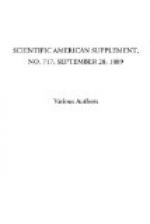Sir Lowthian Bell, Bart., F.R.S., in moving a vote of thanks, said that the meeting had had the privilege of listening to a description of results obtained by a man of exceptional intelligence and learning, supplemented by that devotion of mind which qualified him to pursue his work with great energy and perseverance. The importance of the president’s address could not possibly be overrated. At various periods different substances had been put forward as indications of the civilization of the people. He remembered hearing from Dr. Ure that he considered the consumption of sulphuric acid to be the most accurate measure of the civilization of the people.
In course of time sulphuric acid gave way to soap, the consumption of which was probably still regarded as the great exponent of civilization by such of his fellow citizens as had thereby made their name. From what he had heard that morning, however, he should be inclined to make soap yield to ammonia, as sulphuric acid had in its time succumbed to soap. For not only was ammonia of great importance to us as a manufacturing nation, but it almost appeared to be a condition of our existence. England had a large population concentrated on an area so small as to make it almost a matter of apprehension whether the surface could maintain the people upon it.
We were now importing almost as much food as we consumed, and were thus more and more dependent on the foreigner. Under certain conditions this would become a very serious matter, and thus any one who showed how to produce plenty of ammonia at a cheap rate was a benefactor to his country. Mr. Mond’s process seemed to come nearer to success than any which had preceded it, and it needed no words from him to induce the meeting to accord a hearty vote of thanks to the president for his admirable paper.
Mr. J. C. Stevenson, M.P., in seconding the motion, said that no paper could be more interesting and valuable to the society than that delivered by the president. It opened out a future for the advancement of chemical industry which almost overcame one by the greatness of its possibilities. Mr. Mond had performed an invaluable service by investigating the various methods proposed for the manufacture of ammonia, and clearing the decks of those processes supposed by their inventors to be valuable, but proved by him to be delusive. It gave him hearty pleasure therefore to second the vote of thanks proposed by Sir Lowthian Bell.
The vote having been put and carried by acclamation, after a brief reply from the president:
The secretary read the report of the scrutators, which showed that 158 ballot papers had been sent in, 154 voting for the proposed list intact, and four substituting other names. The gentlemen nominated in the list issued by the Council were therefore declared elected.
* * * * *
In his brief report for the year ending May 1, 1889, the director of the Pasteur Institute, Paris, announces the treatment of 1,673 subjects, of whom 6 were seized with rabies during and 4 within a fortnight after the process. But 3 only succumbed after the treatment had been completely carried out, making 1 death in 554, or, including all cases, 1 in 128.




